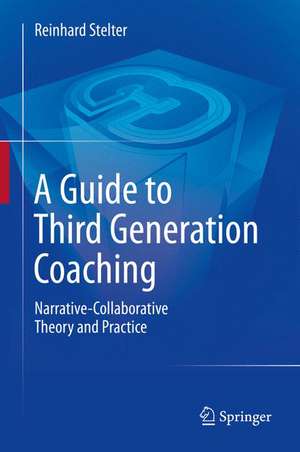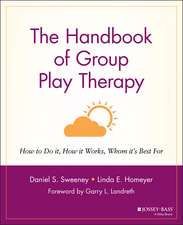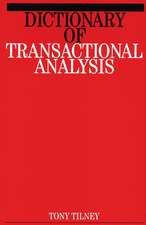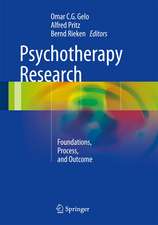A Guide to Third Generation Coaching: Narrative-Collaborative Theory and Practice
Autor Reinhard Stelteren Limba Engleză Hardback – 5 sep 2013
Marking a new trend in coaching, based on the acknowledgement of changes in society, learning and knowledge production, as well as leadership, while distinguishing itself from the existing models (pop coaching, GROW model, etc.). Third generation coaching is based on a fresh analysis of our society – a society that is characterized by diversification, identity challenges, abolition of the monopoly of knowledge, lifelong learning, and the necessity for self-reflection.
Providing quality material to guide ambitious practitioners and high level coaching education programs, in an accessible format. A Guide to Third Generation Coaching advocates a revisited and innovative approach to coaching and coaching psychology, advantageous for learners and practitioners alike, by supporting the reader as a reflective practitioner.
”In this insightful book Reinhard Stelter takes coaching to a new level. With its new perspective, it will make an outstanding contribution to the field.”
Prof Stephen Palmer, Centre for Coaching, London, UK, President of the International Society for Coaching Psychology (ISCP)
“This book is a wonderful contribution to further theoretical understanding and evidence-based practice within Coaching andCoaching Psychology. Reinhard provides us with a look at the foundations contributing to this field, the benefit of his experience and learning, and the evolution of thinking to our current state. Whether you are a coach, coaching psychologist, leader, manager or student, you will find this an excellent resource to expand your thinking, reflection, exploration, and learning on your journey.”
Diane Brennan, MBA, MCC, Past-President International Coach Federation (ICF) in 2008
“A thoughtful and wide ranging journey through the philosophy of coaching. Professor Stelter brings positive psychology, dialogue, and narrative approaches together into a model of coaching designed to meet the needs of clients in today’s world.”
Dr. Michael Cavanagh, MClinPsy, PhD, Deputy Director, Coaching Psychology Unit, School of Psychology, The University of Sydney
| Toate formatele și edițiile | Preț | Express |
|---|---|---|
| Paperback (1) | 386.61 lei 6-8 săpt. | |
| SPRINGER NETHERLANDS – 26 aug 2015 | 386.61 lei 6-8 săpt. | |
| Hardback (1) | 504.17 lei 6-8 săpt. | |
| SPRINGER NETHERLANDS – 5 sep 2013 | 504.17 lei 6-8 săpt. |
Preț: 504.17 lei
Preț vechi: 593.13 lei
-15% Nou
Puncte Express: 756
Preț estimativ în valută:
96.49€ • 100.36$ • 79.65£
96.49€ • 100.36$ • 79.65£
Carte tipărită la comandă
Livrare economică 14-28 aprilie
Preluare comenzi: 021 569.72.76
Specificații
ISBN-13: 9789400771857
ISBN-10: 9400771851
Pagini: 268
Ilustrații: XVIII, 250 p.
Dimensiuni: 155 x 235 x 20 mm
Greutate: 0.55 kg
Ediția:2014
Editura: SPRINGER NETHERLANDS
Colecția Springer
Locul publicării:Dordrecht, Netherlands
ISBN-10: 9400771851
Pagini: 268
Ilustrații: XVIII, 250 p.
Dimensiuni: 155 x 235 x 20 mm
Greutate: 0.55 kg
Ediția:2014
Editura: SPRINGER NETHERLANDS
Colecția Springer
Locul publicării:Dordrecht, Netherlands
Public țintă
Professional/practitionerCuprins
About the author.- Preface.- Acknowledgements.- CHAPTER 1: Introduction.- 1.1. The breakdown of the knowledge monopoly.- 1.2. The need for a new coaching concept.- 1.3. What is coaching?.- 1.4. The goal and structure of the book.- CHAPTER 2: The origins and development of coaching.- 2.1. Societal legitimacy: coaching as an answer to late- and post-modern challenges.- 2.2. Coaching, identity and self-constructions: The self is at stake in the coaching dialogue.- 2.3. Coaching and learning – between personal experience and collaboration.- 2.4. Coaching in the perspective of organization and management theory.- 2.5. Closing remarks.- CHAPTER 3: Intervention theories in coaching and coaching psychology.- 3.1. Coaching as a special dialogue form.- 3.2. Basic intentions in the coaching conversation.- 3.3. The coach’s basic stance.- 3.4. Basic theories and their role in coaching.- 3.5. Additional theories.- 3.6. Closing remarks.- CHAPTER 4: Narrative collaborative coaching – theory and practice.- 4.1. Why coaching as a narrative collaborative practice?.- 4.2. Epistemological basis – bridging the gap between phenomenology and social constructionism.- 4.3. Narrative collaborative practice in coaching.- 4.4. Closing remarks.- CHAPTER 5: Case studies and effect studies of coaching as a narrative collaborative practice.- 5.1. Case studies of my own practice.- 5.2. Perceived effect – a narrative analysis.- 5.3. Statistical effect – social recovery and well-being as the main outcomes.- 5.4. Conclusion in relation to the research project.- 5.5. Closing remarks.- CHAPTER 6: Professional practice between research, knowledge and reflection.- 6.1 Evidence-based practice and practice-based evidence.- 6.2 The knowledge base of coaching practice.-6.3 Developing knowledge, practice and profession.- 6.4 Knowledge between fact and intuition.- CHAPTER 7: Reflective practice among coaching experts.- 7.1. Peter.- 7.2. Steven.- 7.3. Kathrine.- 7.4. Martha.- 7.5. Reflections onpractitioner reflections.- 7.6. Afterthoughts.- CHAPTER 8: In conclusion.- REFERENCES.- INDEX.
Recenzii
From the book reviews:
“There are also many useful practical summaries and applications found in the book for those seeking to learn more about the approach featured in the book. … I recommend that this book be read for a better understanding of one model of the narrative–collaborative approach to coaching. … It provides focus on an approach to coaching that has much for coaches and coaching psychologists to consider as to what their purpose is and how best to achieve it.” (Rodney L. Lowman, PsycCRITIQUES, Vol. 59 (29), July, 2014)
“There are also many useful practical summaries and applications found in the book for those seeking to learn more about the approach featured in the book. … I recommend that this book be read for a better understanding of one model of the narrative–collaborative approach to coaching. … It provides focus on an approach to coaching that has much for coaches and coaching psychologists to consider as to what their purpose is and how best to achieve it.” (Rodney L. Lowman, PsycCRITIQUES, Vol. 59 (29), July, 2014)
Notă biografică
Reinhard Stelter holds a PhD in psychology and is Professor of Sport and Coaching Psychology and head of the Coaching Psychology Unit at the Department of Nutrition, Exercise and Sports, University of Copenhagen. Furthermore he is visiting professor at Copenhagen Business School (Master of Public Governance).
He is Honorary Vice President and accredited member of the International Society for Coaching Psychology, member of the Scientific Advisory Council of the Institute of Coaching at Harvard and editorial board member of the International Coaching Psychology Review, of Coaching: Theory, Research and Practice, of the International Journal of Mentoring and Coaching and co-editor of Coachingpsykologi - The Danish Journal of Coaching Psychology as well as editor and author of many books and journal articles. His theoretical ground in coaching is inspired by phenomenology, systemic thinking, social constructionism and narrative and collaborative practice. In 2009-11 he has been leader of a research project – a randomized control trial – with a focus on narrative-collaborative group coaching, where he could document and positive effect of coaching on personal well-being and social recovery. During the last couple of years he has been invited speaker on coaching and coaching psychology conferences in many parts of the world.
He is Honorary Vice President and accredited member of the International Society for Coaching Psychology, member of the Scientific Advisory Council of the Institute of Coaching at Harvard and editorial board member of the International Coaching Psychology Review, of Coaching: Theory, Research and Practice, of the International Journal of Mentoring and Coaching and co-editor of Coachingpsykologi - The Danish Journal of Coaching Psychology as well as editor and author of many books and journal articles. His theoretical ground in coaching is inspired by phenomenology, systemic thinking, social constructionism and narrative and collaborative practice. In 2009-11 he has been leader of a research project – a randomized control trial – with a focus on narrative-collaborative group coaching, where he could document and positive effect of coaching on personal well-being and social recovery. During the last couple of years he has been invited speaker on coaching and coaching psychology conferences in many parts of the world.
Textul de pe ultima copertă
Reinhard StelterA Guide to Third Generation Coaching
Narrative-Collaborative Theory and Practice
Third generation coaching proposes a form of dialogue where coach and coachee are focused on creating space for reflection through collaborative practices and less concerned with fabricating quick solutions. Aspiring to achieve moments of symmetry between coach and coachee, where their dialogue is driven by a strong emphasis on meaning-making, values, aspirations and identity issues. Coach and coachee meet as fellow-humans in a genuine dialogue.
Marking a new trend in coaching, based on the acknowledgement of changes in society, learning and knowledge production, as well as leadership, while distinguishing itself from the existing models (pop coaching, GROW model, etc.). Third generation coaching is based on a fresh analysis of our society – a society that is characterized by diversification, identity challenges, abolition of the monopoly of knowledge, lifelong learning, and the necessity for self-reflection.
Providing quality material to guide ambitious practitioners and high level coaching education programs, in an accessible format. A Guide to Third Generation Coaching advocates a revisited and innovative approach to coaching and coaching psychology, advantageous for learners and practitioners alike, by supporting the reader as a reflective practitioner.
”In this insightful book Reinhard Stelter takes coaching to a new level. With its new perspective, it will make an outstanding contribution to the field.”
Prof Stephen Palmer, Centre for Coaching, London, UK, President of the International Society for Coaching Psychology (ISCP)
“This book is a wonderful contribution to further theoretical understanding and evidence-based practice within Coaching and Coaching Psychology. Reinhard provides us with a look at the foundations contributing to this field, the benefit of his experience and learning, and the evolution of thinking to our current state. Whether you are a coach, coaching psychologist, leader, manager or student, you will find this an excellent resource to expand your thinking, reflection, exploration, and learning on your journey.”
Diane Brennan, MBA, MCC, Past-President International Coach Federation (ICF) in 2008
“A thoughtful and wide ranging journey through the philosophy of coaching. Professor Stelter brings positive psychology, dialogue, and narrative approaches together into a model of coaching designed to meet the needs of clients in today’s world.”
Dr. Michael Cavanagh, MClinPsy, PhD, Deputy Director, Coaching Psychology Unit, School of Psychology, The University of Sydney
Narrative-Collaborative Theory and Practice
Third generation coaching proposes a form of dialogue where coach and coachee are focused on creating space for reflection through collaborative practices and less concerned with fabricating quick solutions. Aspiring to achieve moments of symmetry between coach and coachee, where their dialogue is driven by a strong emphasis on meaning-making, values, aspirations and identity issues. Coach and coachee meet as fellow-humans in a genuine dialogue.
Marking a new trend in coaching, based on the acknowledgement of changes in society, learning and knowledge production, as well as leadership, while distinguishing itself from the existing models (pop coaching, GROW model, etc.). Third generation coaching is based on a fresh analysis of our society – a society that is characterized by diversification, identity challenges, abolition of the monopoly of knowledge, lifelong learning, and the necessity for self-reflection.
Providing quality material to guide ambitious practitioners and high level coaching education programs, in an accessible format. A Guide to Third Generation Coaching advocates a revisited and innovative approach to coaching and coaching psychology, advantageous for learners and practitioners alike, by supporting the reader as a reflective practitioner.
”In this insightful book Reinhard Stelter takes coaching to a new level. With its new perspective, it will make an outstanding contribution to the field.”
Prof Stephen Palmer, Centre for Coaching, London, UK, President of the International Society for Coaching Psychology (ISCP)
“This book is a wonderful contribution to further theoretical understanding and evidence-based practice within Coaching and Coaching Psychology. Reinhard provides us with a look at the foundations contributing to this field, the benefit of his experience and learning, and the evolution of thinking to our current state. Whether you are a coach, coaching psychologist, leader, manager or student, you will find this an excellent resource to expand your thinking, reflection, exploration, and learning on your journey.”
Diane Brennan, MBA, MCC, Past-President International Coach Federation (ICF) in 2008
“A thoughtful and wide ranging journey through the philosophy of coaching. Professor Stelter brings positive psychology, dialogue, and narrative approaches together into a model of coaching designed to meet the needs of clients in today’s world.”
Dr. Michael Cavanagh, MClinPsy, PhD, Deputy Director, Coaching Psychology Unit, School of Psychology, The University of Sydney
Caracteristici
Introduces a new conceptual framework for coaching practice Unique approach connects coaching to societal changes in society, work and life Strong focus on the importance of values and meaning in the coaching process Provides excellent material for ambitious practitioners and high level coaching education programs by supporting the reader as a reflective practitioner Includes supplementary material: sn.pub/extras
















